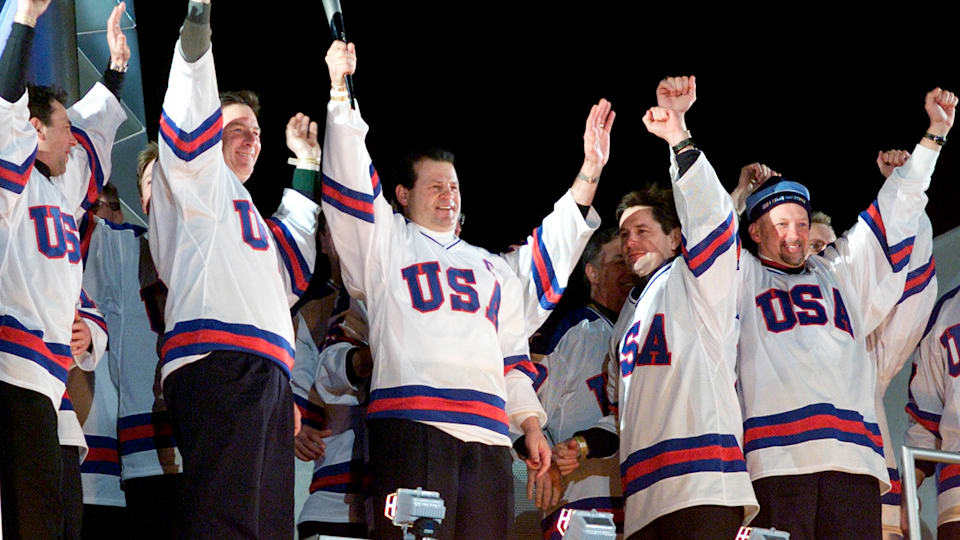
Welcome to This Week in Olympic Sports History, where Olympics.com remembers the most significant sports events of the past. This week covers events from February 19 to 25.
During this week in history, we witnessed one of the biggest upsets in Olympic history - 'The Miracle on Ice' in Lake Placid 1980, where the US ice hockey surprisingly defeated the Soviet Union.
Additionally, notable Olympic champions were born in this week, including table tennis legend Ma Lin (PR China) and Hubert Van Innis, Belgium's most decorated Olympian. Olympics.com looks at some of the most notable Olympic birthdays from February 19 to 25 in our weekly examination of the week in Olympic sports history.
Notable Olympic birthdays: 19-25 February
- Becky Dyroen-Lancer (USA, Artistic swimming Olympic Champion), born 19 February 1971
- Ma Lin, (China, Table Tennis, Three-Time Olympic Champion), born 19 February 1980
- Darold Williamson (USA, Athletics, Olympic Champion), born February 19 1983
- Charles Barkley (USA, Basketball, Two-Time Olympic Champion), born 20 February 1963
- Sarah Ryan (Australia, Swimming, Olympic Champion), born 20 February 1977
- Leroy Burrell (USA, Athletics, Olympic Champion), born 21 February 1967
- Gigi Fernández (USA, Tennis,Two-Time Olympic Champion), born 22 February 1964
DOHA, QATAR - NOVEMBER 30: Ma Lin of China returns a shot to Ahmed Ahmed of Qatar during the Men's Table Tennis Team Quarter Finals at the 15th Asian Games Doha 2006 at Al-Arabi Indoor Hall on November 30, 2006 in Doha, Qatar. (Photo by Christof Koepsel/Getty Images for DAGOC)
- William Tanui (Kenya, Athletics, Olympic Champion), born 22 February 1964
- Tessa Bonhomme, (Canada, Ice Hockey, Olympic Champion), born 23 February 1985
- Hubert Van Innis (Belgium, Archery, Six-Time Olympic Champion), born 24 February 1866
- Floyd Mayweather, Jr.(USA, Boxing, Olympic Bronze medalist), born 24 February 1977
- Barney Ewell (USA, Athletics, Olympic Champion), born 25 February 1918
- Herb Elliott (Australia, Athletics, Olympic Champion), born 25 February 1938
- Lee Evans (USA, Athletics, Two-Time Olympic Champion), born 25 February 1947
- Xing Huina (China, Athletics, Olympic Champion) born 25 February 1984
On This Day: February 22 1980 - 'The Miracle on Ice'
The crisp winter air in Lake Placid, New York, carried an electric charge on February 22, 1980. On this day, the Olympics Winter Games witnessed one of the biggest upsets in sports history. The United States Olympic hockey team, considered an underdog, faced off against the heavy favourite Soviet Union, which had won four gold medals in a row. Despite the odds stacked against them, the U.S. team, led by their coach, Herb Brooks, displayed sheer determination and resilience.
During the preliminary group stage, both teams maintained flawless records, with the American team delivering some unexpected performances, including a 7-3 upset victory over Czechoslovakia. As the tournament transitioned to the medal round, the stage was set for a monumental clash between the two rivals. The game was tense, with the first period ending in a deadlock at 2-2 and the Soviets seizing a 3-2 lead in the second.
"Do You Believe in Miracles? ... Yes!"
Team USA did not give up, scoring two crucial goals in the third and final period, which gave them a lead they fiercely defended until the final buzzer. Ultimately, the Americans narrowly defeated the Soviets 4-3.
Just forty-eight hours later, the U.S. team clinched the gold medal in a decisive victory over Finland. "The Miracle on Ice" represented a triumph and a symbol of hope and unity amid Cold War tensions. The victory transcended the confines of the rink, uniting a nation divided by politics and ideology.
In the years that followed, the match became one of the most unforgettable moments in Olympic history, celebrated by fans across the globe. The legendary broadcaster Al Michaels' iconic call at the game's final second, "Do you believe in miracles? YES!" instantly became a classic. From being recognised by Sports Illustrated as the top sports moment of the 20th century to holding a special place in the hearts of American ice hockey fans, the game will always be remembered as a significant event in sports.
Quote of the week - Hubert Van Innis
"Visualise success and believe in yourself"
Born on February 24, 1866, Hubert Van Innis was one of Belgium's most successful Olympians. He dominated archery with six gold and three silver medals throughout two Summer Olympics, separated by two decades.
Archery was introduced to the Olympics in 1900 during the Paris Games. The Belgian, already an experienced archer in his mid-30s, won a silver medal in the 50-meter cordon doré event. He went on to win double gold in both the 33-meter cordon doré and the tir au chapelet events.
Although he didn't participate in the next two Olympic games held in St. Louis in 1904 and London in 1908, Van Innis made a comeback to the Olympic arena on home soil at Antwerp in 1920 when he was in his mid-50s.
The Olympic Champion once again demonstrated his mastery of the bow, triumphing in the individual 28-meter and 33-meter moving bird target events. Adding to his medal haul, he secured silver in the 50-meter competition and contributed to two team golds in the moving bird target events.
Van Innis remained active until his death on November 25, 1961, at 95. He left an enduring legacy as a legend who believed in visualising success.
Be sure to check back next week for another Olympics.com look back into sports and Olympic history.
